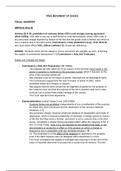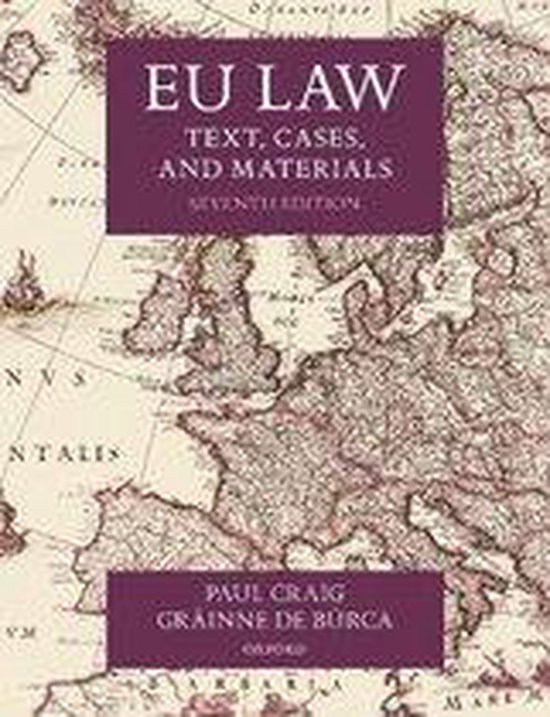FREE MOVEMENT OF GOODS
FISCAL BARRIERS
ARTICLE 28 & 30
Articles 28 & 30: prohibition of customs duties (CD’s) and charges having equivalent
effect (CEEs). CDs refer to any tax or tariff levied on imported products, where CEEs refer to
any pecuniary charge imposed by reason of the fact that the goods cross a frontier and which is
not a customs duty in the strict sense (Commission v Italy (statistical Levy)). Arts. 28 & 30
also have direct effect (VGL; Alfons Lutticke [1]). Goods are defined as:
GOODS: “Products which can be valued in money and which are capable, as such, of forming
the subject of commercial transactions” [1] (Commission v Italy (Art Treasures) .
Duties and Charges are illegal:
- Commission v Italy (Art Treasures)(7-68 [1968]):
- The disputed tax falls within Art.16 by reason of the fact that export trade in the
goods in question is hindered by the pecuniary burden which it imposes on the
price of the exported articles [2]
- Italy imposed a tax on the export of artistic, historical and archaeological items.
The Commission argued that this was in breach of article 16 EEC, which
prohibited duties and charges on exports.
- Italy argued that the items should not be regarded as goods for the purpose of
the customs union and that the purpose of the tax in question was not to raise
revenue, but to protect that artistic heritage of the country.
- The Court rejected these arguments.
- Diamantarbeiders (Joined Cases 2 and 3 69 [1969])
- Customs Duties are prohibited independently of any consideration of the purpose
for which they were introduced and the destination of the revenue obtained
therefrom. [13]
- Any pecuniary charge, however small and whatever its designation and mode of
application, which is imposed unilaterally on domestic or foreign goods by reason
of the fact that they cross a frontier, and which is not a customs duty in the strict
sense, constitutes a charge having equivalent effect within the meaning of Art. 9
and 12 of the Treaty, even if it is not imposed for the benefit of the state, is not
discriminatory or protective in effect or if the product on which a charge is
imposed is not in competition with any domestic product. [18]
- I.e. The emphasis is on the effect of the measure as opposed to the purpose,
even if the state measure was not designed with protectionism in mind.
- The Court considered the legality of a Belgian law requiring 0.33 per cent of the
value of imported diamonds to be paid into a social fund for workers. The fact
, that the purpose of the fund was neither to raise money for the exchequer nor to
protect domestic industry did not save the charge in question. It was sufficient
that the charge was imposed on goods because that had crossed a border.
- See Also: 485&486/93 Maria Simitzi; 441&442/98 IKA; 293/02 Jersey Potato
Marketing Board
CEE’s are illegal:
- Commission v Italy (Statistical Levy) (24-68 [1969])
- Any pecuniary charge, however small and whatever its designation and mode of
application, which is imposed unilaterally on domestic or foreign goods by reason
of the fact that they cross a frontier, and which is not a customs duty in the strict
sense, constitutes a charge having equivalent effect, even if it is not imposed for
the benefit of the State, is not discriminatory or protective in effect and if the
product on which the charge is imposed is not in competition with any domestic
product. [9]
- Italy imposed a levy on goods exported to other Member States with the
ostensible purpose of collecting statistical material for use in discerning trade
patterns. The Court reiterated its holding that customs duties were prohibited
irrespective of the purpose for which the duties were imposed, and irrespective of
the destination of the revenues which were collected it then held.
- Diamantarbeiders:
- Again, even if the effect of the measure was not designed with protectionism in
mind [18].
- The prohibition on CEE’s are designed to catch protectionist measures that create a
similar barrier to trade to customs duties stricto sensu.
- The extension of the prohibition of CD’s to CEE’s is intended to supplement the
prohibition against obstacles to trade created by such duties by increasing its efficiency.
- See also: Case 29/72 Marimex spA v Italian Finance Administration; Case 39/73
Rewe-Zentralfinanz v Firektor der Landwirtschaftskammer Westfalen-Lippe; C-
130/93 Lamaire NV; C-16/94 Garonor Exploitation SA; C-72/03 Carbonati Apuani; C-
234/99 (Niels Nygard)
Parafiscal Charges/ taxation (a tax on a specific product or service by which a government
levies money for a certain purpose)
- Scharbatke (C-72/92 [1993])
- If the advantages stemming from the use of the revenue from a contribution
which constitutes a parafiscal charge fully offset the burden borne by the
domestic product when it is placed on the market, that contribution constitutes a
, charge having an effect equivalent to customs duties, contrary to Articles 9 and
12 of the Treaty. If those advantages only partly offset the burden borne by
domestic products, the charge in question is subject to Article 95 (Art. 110) of the
Treaty. In the latter case, the charge would be incompatible with Article 95 of the
Treaty and is therefore prohibited to the extent to which it discriminates against
imported products, that is to say to the extent to which it partially offsets the
burden borne by the taxed domestic product. [10]
- Capolongo (77/72 [1973]
- In the interpretation of the Concept ‘charge having an effect equivalent to a
customs duty on Imports’, the destination of the financial charges levied must be
taken into account. [13]
In effect, when such a financial charge of duty is intended exclusively to support
activities which specifically profit taxed domestic products, it can follow that the
general duty levied according to the same criteria on the imported product and
the domestic product nevertheless constitutes for the former a net
supplementary tax burden, whilst for the latter it constitutes in reality a set-off
against benefits or aids previously received. [13]
- Consequently, a duty within the General System of Internal Taxation applying
systematically to domestic and imported products according to the same criteria,
can nevertheless constitute a charge having an effect equivalent to customs duty
on imports, when such contribution is intended exclusively to support activities
which specifically benefit the taxed domestic product. [14]
EXCEPTIONS
Exceptions are laid out in Commission v Germany [6] - some CEEs are outside the scope of
arts. 28 & 30 (and therefore no breach will occur) if they are:
- Commission v Germany (18/87 [1988])
- The Court has held that a charge escapes that classification if it relates to a
general system of internal dues applies systematically and in accordance with
the same criteria to domestic products and imported products alike (Denkavit), if
it constitutes payment for a service in fact rendered to the economic operator of
a sum in proportion to the service (Commission v Denmark), or if it attaches to
inspections carried out to fulfil obligations imposed by Community law (Bauhuis)
[6]
- German regional authorities charged fees on live animals imported into the
country to cover the cost of inspections required by directive 81/389.
1. Part of a General System of Internal Dues systematically applied to imported and
domestic products alike:
, - Dansk Denkavit (29/87 [1988]):
- An annual levy charged in like manner on importers and national producers of
feedingstuffs in tended to cover the costs incurred by the state in checking
samples is compatible … with the Treaty [36]
- Danish law required that the importer (of feeding stuffs) obtain an authorisation
from the Ministry of Agriculture, and charged an annual levy to meet the costs of
checking samples of the goods.
- The ECJ held that this authorization was caught by what is now Article 34 TFEU,
but that it could be justified under Article 36 TFEU.
- Alfons Lutticke (57/65 [1966])
- Charges having an effect equivalent to customs duties on the one hand and
internal taxation on the other are governed by different systems. In this respect it
should be noted that a charge intended to offset the effect of internal taxation
thereby takes on the internal character of the taxation whose effect it is intended
to offset. [2]
- I.e. A charge cannot be governed by both Arts. 28, 30 and 110 at the same time.
CEEs and internal taxation are mutually exclusive.
2. Payment for Services rendered to the importer:
- Bresciani (87/75 [1976])
- First, The fact that the charge is proportionate to the quantity of the goods and
not to their value distinguishes a duty of the type at issue from charges which fall
within the prohibition. [6]
- Second, a pecuniary charge of the type at issue is no more than the
consideration required from individuals who, through their own action in
importing products of animal origin, cause a service to be rendered. [6]
- Third, although there may be differences in the method and time of this
application, the duty at issue is also levied on similar products of domestic origin.
[6]
- Since the provision according to which consultation regarding the conditions of
application of the convention shall take place only at the request of an
associated state, it follows that the abolition of CEE must .. proceed
automatically [24].
- The Italian authorities imposed a charge for compulsory veterinary and public-
health inspections carried out on imported raw cowhides.
- I.e. In order for a measure to fall into this exception, a payment/charge/duty must
be:






